新概念第一册第55课
- 格式:ppt
- 大小:932.00 KB
- 文档页数:36
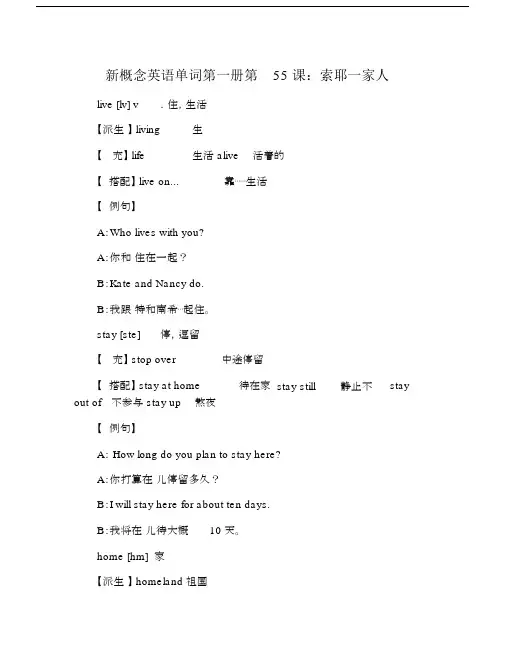
新概念英语单词第一册第55 课:索耶一家人live [lv] v.住,生活【派生】 living生【充】 life生活alive活着的【搭配】 live on...靠⋯⋯生活【例句】A:Who lives with you?A:你和住在一起?B:Kate and Nancy do.B:我跟特和南希⋯起住。
stay [ste]停,逗留【充】 stop over中途停留【搭配】 stay at home待在家stay still 静止不stay out of不参与stay up熬夜【例句】A: How long do you plan to stay here?A:你打算在儿停留多久?B:I will stay here for about ten days.B:我将在儿待大概10 天。
home [hm] 家【派生】 homeland 祖国【单词搭配】 at home 在家 go home 回家【单词例句】A:I must go back home where many things are waitingfor me to settleB: We're very sorry to see you go.A:我必须回国了,很多事正等着我去处理。
B:您要走了,我们感到非常遗憾。
housework['hauswa :k] 家务【单词构造】 house(房子) +work(工作) = housework (家务)【单词搭配】 do the housework做家务【单词例句】A: My mother always says I spend too much timeon watching TVA:我妈妈总是说我把太多的时间花费在看电视上。
B: Then you should finish your homework, and thenhelp your parents with the housework some day.B:那你以后应该先完成家庭怍业,然后帮父母做些家务。
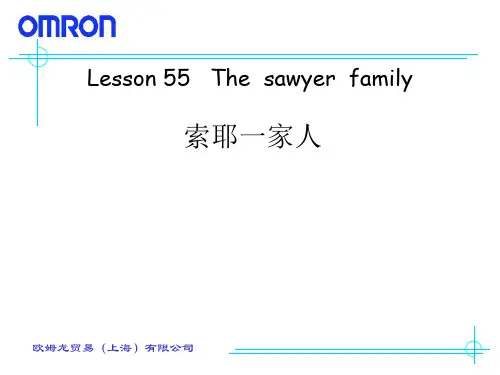


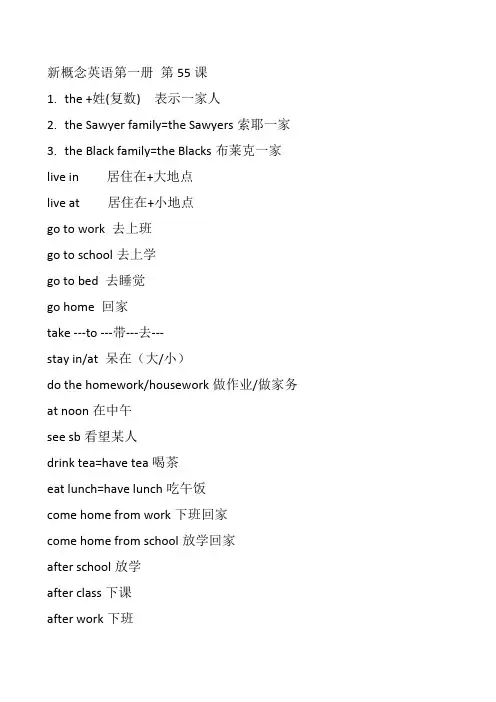
新概念英语第一册第55课1.the +姓(复数) 表示一家人2.the Sawyer family=the Sawyers索耶一家3.the Black family=the Blacks布莱克一家live in 居住在+大地点live at 居住在+小地点go to work 去上班go to school去上学go to bed 去睡觉go home 回家take ---to ---带---去---stay in/at 呆在(大/小)do the homework/housework做作业/做家务at noon在中午see sb看望某人drink tea=have tea喝茶eat lunch=have lunch吃午饭come home from work下班回家come home from school放学回家after school放学after class下课after work下班arrive in/at到达(大/小)arrive home(省略介词) 到家at night在夜晚at noon在正午(中午12:00)at midnight在午夜(半夜12:00)read newspapers读报纸测试:表示一家人(两种表示)索耶一家(两个短语)布莱克一家(两个短语)居住在+大地点居住在+小地点去上班去上学去睡觉回家带---去---呆在(大/小)做作业/做家务在中午看望某人喝茶吃午饭下班回家放学回家放学下课下班到达(大/小)到家在夜晚在正午(中午12:00)在午夜(半夜12:00)读报纸。
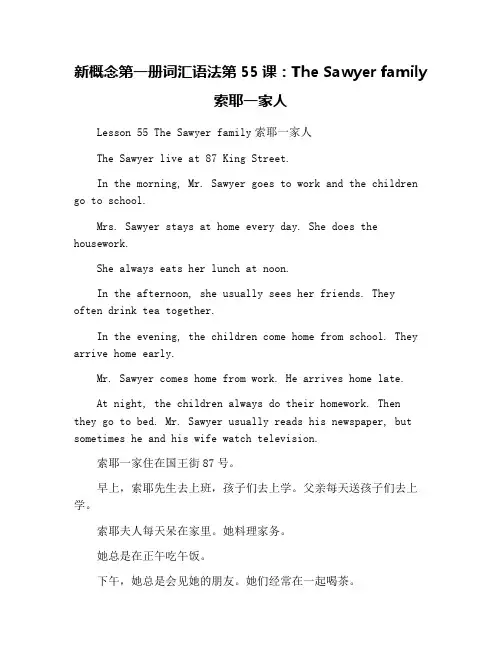
新概念第一册词汇语法第55课:The Sawyer family索耶一家人Lesson 55 The Sawyer family索耶一家人The Sawyer live at 87 King Street.In the morning, Mr. Sawyer goes to work and the children go to school.Mrs. Sawyer stays at home every day. She does the housework.She always eats her lunch at noon.In the afternoon, she usually sees her friends. They often drink tea together.In the evening, the children come home from school. They arrive home early.Mr. Sawyer comes home from work. He arrives home late.At night, the children always do their homework. Then they go to bed. Mr. Sawyer usually reads his newspaper, but sometimes he and his wife watch television.索耶一家住在国王街87号。
早上,索耶先生去上班,孩子们去上学。
父亲每天送孩子们去上学。
索耶夫人每天呆在家里。
她料理家务。
她总是在正午吃午饭。
下午,她总是会见她的朋友。
她们经常在一起喝茶。
傍晚,孩子们放学回家。
他们到家很早。
索耶先生下班回家。
他到家很晚。
晚上,孩子们总是做作业,然后去睡觉。
索耶先生总是读报纸,但有时和他的妻子一起看电视。
1.go to work, 上班。

新概念英语第一册单词第55课:索耶一家人live [lv] v.住,生活【派生词】living生计【单词扩充】life生活 alive活着的【单词搭配】live on...靠……生活【单词例句】A:Who lives with you?A:你和谁住在一起?B:Kate and Nancy do.B:我跟凯特和南希…起住。
stay [ste] 停,逗留【单词扩充】stop over中途停留【单词搭配】stay at home待在家 stay still静止不动 stay out of不参与 stay up熬夜【单词例句】A: How long do you plan to stay here?A:你打算在这儿停留多久?B:I will stay here for about ten days.B:我将在这儿待大概10天。
home [hm] 家【派生词】homeland祖国【单词搭配】at home在家 go home回家【单词例句】A:I must go back home where many things are waiting for me to settleB: We're very sorry to see you go.A:我必须回国了,很多事正等着我去处理。
B:您要走了,我们感到非常遗憾。
housework['hauswa:k]家务【单词构造】house(房子)+work(工作)= housework(家务)【单词搭配】do the housework做家务【单词例句】A: My mother always says I spend too much time on watching TVA:我妈妈总是说我把太多的时间花费在看电视上。
B: Then you should finish your homework, and then help your parents with the housework some day.B:那你以后应该先完成家庭怍业,然后帮父母做些家务。
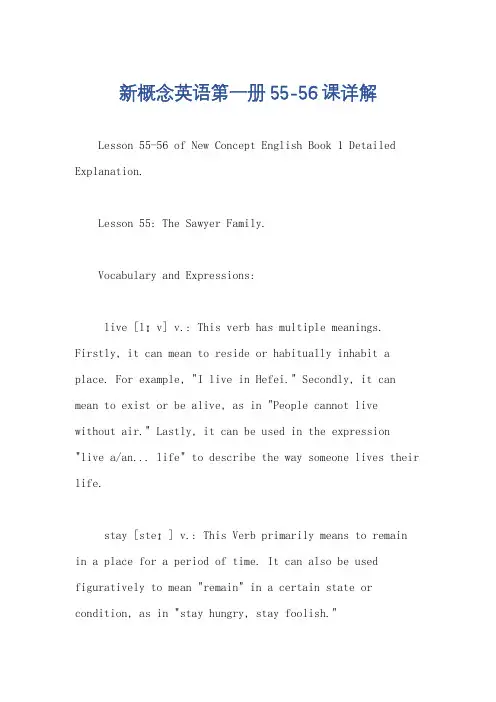
新概念英语第一册55-56课详解Lesson 55-56 of New Concept English Book 1 Detailed Explanation.Lesson 55: The Sawyer Family.Vocabulary and Expressions:live [lɪv] v.: This verb has multiple meanings. Firstly, it can mean to reside or habitually inhabit a place. For example, "I live in Hefei." Secondly, it can mean to exist or be alive, as in "People cannot live without air." Lastly, it can be used in the expression "live a/an... life" to describe the way someone lives their life.stay [steɪ] v.: This Verb primarily means to remain in a place for a period of time. It can also be used figuratively to mean "remain" in a certain state or condition, as in "stay hungry, stay foolish."home [həʊm] n./adv.: As a noun, it refers to the place where one lives. As an adverb, it means "to the place where one lives," as in "go home."housework ['haʊswɜːk] n.: This noun refers to the tasks related to maintaining a household, such as cleaning, cooking, and laundry.lunch [lʌnʃ] n.: This noun refers to the meal eaten in the middle of the day.afternoon [ɑːftə'nuːn] n.: This noun refers to the period of time between noon and evening.Text Explanation:Lesson 55 introduces the Sawyer family and their daily routine. The lesson begins by introducing the family members and their occupations. Mr. Sawyer works in an office, while Mrs. Sawyer stays at home. The children go to school. The lesson then goes on to describe their eveningactivities. Mr. Sawyer usually arrives home from work at about five o'clock, and the family then has their lunch together. In the afternoon, they often have a rest, andthen in the evening, they usually stay at home and watch television.Grammar Points:The use of "-s" or "-es" to form the third-person singular present tense of verbs is reinforced in this lesson. For example, "Mr. Sawyer usually arrives home from work at about five o'clock."The use of prepositions with "live" is also introduced. For example, "Mr. Sawyer lives in a town near London,"where "in" is used with a large place, and "Mrs. Sawyerlives at 87 King Street," where "at" is used with aspecific address.Lesson 56: What Do They Do?Vocabulary and Expressions:together [tə'geðə] adv.: This adverb means "in a group" or "side by side."evening ['iːvnɪŋ] n.: This noun refers to the time of day that comes after afternoon and before night.arrive [ə'raɪv] v.: This Verb means to reach a destination after a journey.night [naɪt] n.: This noun refers to the period of time from sunset to sunrise.Text Explanation:Lesson 56 continues the theme of the Sawyer family's daily life by asking the question, "What do they do?" The lesson provides information about the family's evening activities. Mr. Sawyer usually arrives home from work at about five o'clock, and then the family has their tea together. After tea, they usually sit in the living room and watch television. Sometimes, they go to the cinema orto the theater. On Sundays, they often go for a walk in the park.Grammar Points:The present tense of verbs is reinforced in this lesson, particularly the use of the third-person singular form.The lesson also introduces the use of modal verbs such as "can" and "usually" to express ability and frequency.Conclusion:Lessons 55 and 56 of New Concept English Book 1 focus on the Sawyer family's daily routine and activities. These lessons introduce new vocabulary and expressions related to family life, daily activities, and grammar points such as the use of "-s" or "-es" in the third-person singular present tense and the use of modal verbs. By learning these lessons, students can improve their understanding of family life in English-speaking countries and enhance theirlanguage skills in areas such as vocabulary, grammar, and comprehension.。
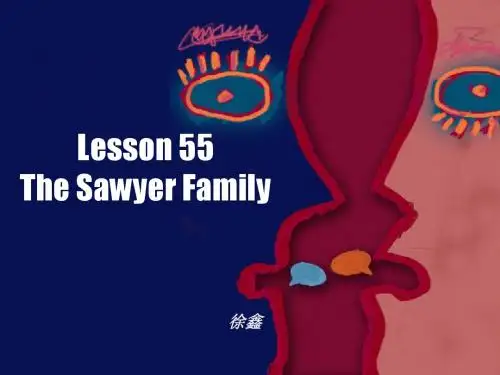
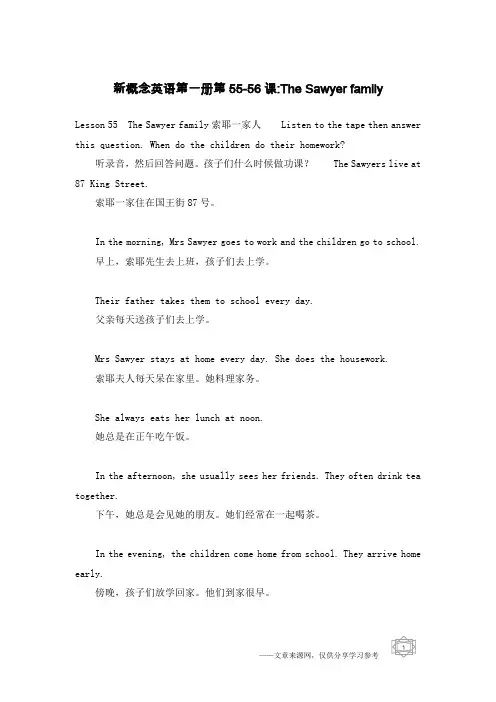
新概念英语第一册第55-56课:The Sawyer familyLesson 55 The Sawyer family索耶一家人Listen to the tape then answer this question. When do the children do their homework?听录音,然后回答问题。
孩子们什么时候做功课?The Sawyers live at 87 King Street.索耶一家住在国王街87号。
In the morning, Mrs Sawyer goes to work and the children go to school.早上,索耶先生去上班,孩子们去上学。
Their father takes them to school every day.父亲每天送孩子们去上学。
Mrs Sawyer stays at home every day. She does the housework.索耶夫人每天呆在家里。
她料理家务。
She always eats her lunch at noon.她总是在正午吃午饭。
In the afternoon, she usually sees her friends. They often drink tea together.下午,她总是会见她的朋友。
她们经常在一起喝茶。
In the evening, the children come home from school. They arrive home early.傍晚,孩子们放学回家。
他们到家很早。
Mr Sawyer comes home from work. He arrives home late.索耶先生下班回家。
他到家很晚。
At night, the children always do their homework. Then they go to bed.晚上,孩子们总是做作业,然后去睡觉。
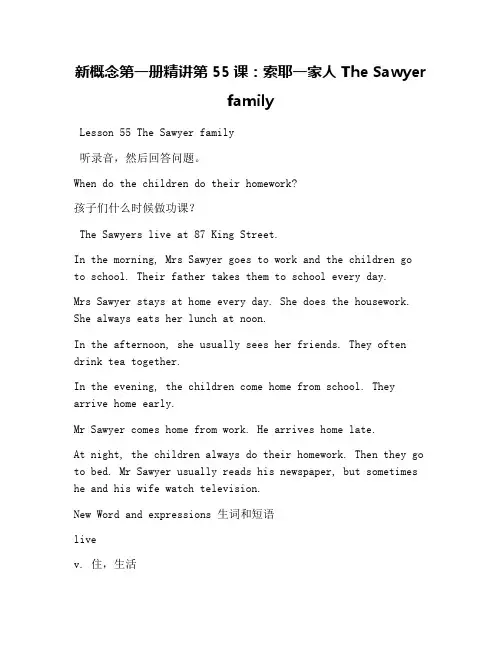
新概念第一册精讲第55课:索耶一家人 The SawyerfamilyLesson 55 The Sawyer family听录音,然后回答问题。
When do the children do their homework?孩子们什么时候做功课?The Sawyers live at 87 King Street.In the morning, Mrs Sawyer goes to work and the children goto school. Their father takes them to school every day.Mrs Sawyer stays at home every day. She does the housework. She always eats her lunch at noon.In the afternoon, she usually sees her friends. They often drink tea together.In the evening, the children come home from school. They arrive home early.Mr Sawyer comes home from work. He arrives home late.At night, the children always do their homework. Then they go to bed. Mr Sawyer usually reads his newspaper, but sometimes he and his wife watch television.New Word and expressions 生词和短语livev. 住,生活stayv. 呆在,停留homen. 家;adv. 到家houseworkn. 家务lunchn. 午饭afternoonn. 下午usuallyadv. 通常together adv. 一起eveningn. 晚上arrivev. 到达nightn. 夜间参考译文索耶一家住在国王街87号。
新概念英语第一册55课课文原文Lesson 55 The Sawyer family索耶一家人The Sawyer live at 87 King Street.In the morning, Mr. Sawyer goes to work and the children go to school. Their father takes them to school every day.Mrs. Sawyer stays at home every day.She does the housework.She always eats her lunch at noon.In the afternoon, she usually sees her friends.They often drink tea together.In the evening, the children come home from school.They arrive home early.Mr. Sawyer comes home from work.He arrives home late.At night, the children always do their homework.Then they go to bed.Mr. Sawyer usually reads his newspaper, but sometimes he and his wife watch television.参考译文索耶一家住在国王街87号。
早上,索耶先生去上班,孩子们去上学。
父亲每天送孩子们去上学。
索耶夫人每天呆在家里。
她料理家务。
她总是在正午吃午饭。
下午,她总是会见她的朋友。
她们经常在一起喝茶。
傍晚,孩子们放学回家。
他们到家很早。
索耶先生下班回家。
他到家很晚。
晚上,孩子们总是做作业,然后去睡觉。
索耶先生总是读报纸,但有时和他的妻子一起看电视。
新概念英语单词第一册第55课:索耶一家人live [lv] v.住,生活【派生词】living生计【单词扩充】life生活 alive活着的【单词搭配】live on...靠……生活【单词例句】A:Who lives with you?A:你和谁住在一起?B:Kate and Nancy do.B:我跟凯特和南希…起住。
stay [ste] 停,逗留【单词扩充】stop over中途停留【单词搭配】stay at home待在家 stay still静止不动 stay out of不参与 stay up熬夜【单词例句】A: How long do you plan to stay here?A:你打算在这儿停留多久?B:I will stay here for about ten days.B:我将在这儿待大概10天。
home [hm] 家【派生词】homeland祖国【单词搭配】at home在家 go home回家【单词例句】A:I must go back home where many things are waiting for me to settleB: We're very sorry to see you go.A:我必须回国了,很多事正等着我去处理。
B:您要走了,我们感到非常遗憾。
housework['hauswa:k]家务【单词构造】house(房子)+work(工作)= housework(家务)【单词搭配】do the housework做家务【单词例句】A: My mother always says I spend too much time on watching TVA:我妈妈总是说我把太多的时间花费在看电视上。
B: Then you should finish your homework, and then help your parents with the housework some day.B:那你以后应该先完成家庭怍业,然后帮父母做些家务。